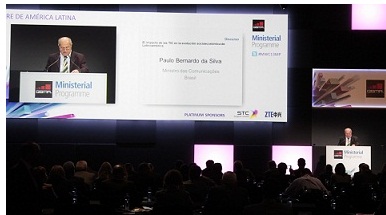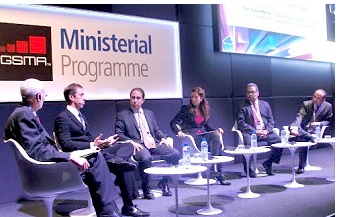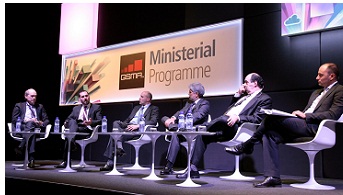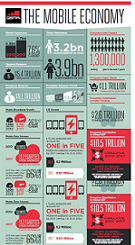Held in Barcelona, Spain, the Mobile World Conference boasted a strong show from Latin America. The Latin American Regional Summit 2013 (part of GSMA’s Ministerial Programme) brought together the official delegates from LATAM countries who had attended the MWC. During the summit meeting on February 26th, delegates held straightforward discussions with executives from mobile operators and GSMA members suppliers.
The first speaker at the summit was Sebastián Cabello, Director of GSMA Latin America. Cabello focused on the significant growth the region is experiencing and on the ICT indicators that reveal how mobile technologies are  revolutionizing life in LATAM countries. “The expansion of the mobile industry has to do with the region’s economic growth. However, it also depends on certain critical public policy decisions that have fostered growth in the sector,” said Cabello.
revolutionizing life in LATAM countries. “The expansion of the mobile industry has to do with the region’s economic growth. However, it also depends on certain critical public policy decisions that have fostered growth in the sector,” said Cabello.
“Connecting Latin America through Mobile Technology” was the slogan of the Summit, whose keynote speaker was Paulo Bernardo da Silva, the Brazilian Minister of Communications. According to da Silva, “Telecommunications should play an important role in economic growth and mobile technologies are fundamental to increasing Internet access across the population.”
Another speaker at the Latin American Regional Summit was Ernesto Flores-Roux, a researcher of Telecom CIDE, who presented examples of how a  more collaborative environment between regulators and industry can pave the way for more efficient, stable public policies in the long term. “Significant investments are needed to achieve the dream of making broadband universal and closing the digital gap. Thus, we must create an environment that promotes investment, most of which should come from the private sector,” affirmed the telecommunications specialist. “This enormous challenge requires collaboration between those who make the regulations and those who must comply with them. But the relationship between the two parties has been wrought with disputes, contention and noncooperation, all of which must be avoided in order to achieve better results from both an economic and a social perspective,” concluded Flores-Roux.
more collaborative environment between regulators and industry can pave the way for more efficient, stable public policies in the long term. “Significant investments are needed to achieve the dream of making broadband universal and closing the digital gap. Thus, we must create an environment that promotes investment, most of which should come from the private sector,” affirmed the telecommunications specialist. “This enormous challenge requires collaboration between those who make the regulations and those who must comply with them. But the relationship between the two parties has been wrought with disputes, contention and noncooperation, all of which must be avoided in order to achieve better results from both an economic and a social perspective,” concluded Flores-Roux.
With its focus on public policy and regulation to drive investments in the mobile industry, the summit brought together a panel of experts to discuss the need for public-private partnerships to encourage the deployment of mobile broadband across Latin America. The panel members included Edwin Castillo, National Telecommunications Director at ASEP Panama; Mónica Aspe Bernal, Coordinator of the Information and Knowledge Society of Mexico; Doyle Gallegos, Global Practice Leader of the ICT at the World Bank; Pedro Ripper, Director of Innovation and New Businesses at Oi; and Robert Pepper, Vice-President of Cisco’s Global Technology Policy.
 In addition, the president of Anatel Brazil, Joao Batista de Rezende, participated on a panel discussing the regulatory decisions required to close the digital gap in Latin America through mobile technology. The president of Anatel stated that the regulating entity for telecommunications plays a critical role in providing regulatory stability for investments. He emphasized that public consultations, a popular tool in Brazil for gathering information from the general public and from those involved in certain segments or areas, are highly useful when assessing the industry’s contributions to new public policies. Other panel members included Antonio Carlos Valente, President of Telefónica Brasil; Antonio Garcia Zaballos, Senior Telecommunications Advisor at the Inter-American Development Bank; Pablo Bello, Secretary General of AHCIET, and Rafael Steinhauser, SVP and President of Qualcomm Latin America.
In addition, the president of Anatel Brazil, Joao Batista de Rezende, participated on a panel discussing the regulatory decisions required to close the digital gap in Latin America through mobile technology. The president of Anatel stated that the regulating entity for telecommunications plays a critical role in providing regulatory stability for investments. He emphasized that public consultations, a popular tool in Brazil for gathering information from the general public and from those involved in certain segments or areas, are highly useful when assessing the industry’s contributions to new public policies. Other panel members included Antonio Carlos Valente, President of Telefónica Brasil; Antonio Garcia Zaballos, Senior Telecommunications Advisor at the Inter-American Development Bank; Pablo Bello, Secretary General of AHCIET, and Rafael Steinhauser, SVP and President of Qualcomm Latin America.
The Ministerial Program and the economic contribution of the mobile ecosystem
In its 2013 edition, the GSMA Ministerial Program attracted more than 1,000 participants, including 143 delegations from 129 countries and 14 international organization, 69 ministers and 85 officials from regulatory bodies, 130 CEOs from the industry and 102 speakers specializing in telecommunications.
Latin America had a strong presence at the Ministerial Program, with 17 countries from the region represented by delegates from the ministries and regulatory entities who held bilateral meetings with GSMA.
Attendance at the Mobile World Congress 2013 was far and beyond the expectations of organizers: More than 72,000 people from nearly 200 countries came to Barcelona for the four-day conference; at least half of those were C-level, including more than 4,300 CEOs.
During the conference, GSMA gave an update on Mobile Economy 2013, which already has 6.8 billion global connections. Revenues in the mobile ecosystem totaled $1.6 trillion in 2012, or 2.2 percent of the global GDP. By 2017, the mobile industry will invest $1.1 trillion in capital expenditures and contribute $2.6 trillion in public funding.
Resources
![]() Presentation by Ernesto Flores-Roux from Telecom CIDE
Presentation by Ernesto Flores-Roux from Telecom CIDE
![]() Photo Gallery: Latin American Regional Summit 2013
Photo Gallery: Latin American Regional Summit 2013
![]() Wireless Intelligence: Mobile World Congress 2013 wrap-up
Wireless Intelligence: Mobile World Congress 2013 wrap-up
![]() Interview to Sebastián Cabello, GSMA Latin America Director, by Mediatelecom
Interview to Sebastián Cabello, GSMA Latin America Director, by Mediatelecom
